Noni is said to help improve the conditions of diabetes, cancer, cardiovascular disease, urinary tract infections and other disorders.
Noni (Morinda citrifolia) is a tree in the coffee family, Rubiaceae. It is native to the tropical regions of the Pacific Ocean. The fruit is eaten as food by Southeast Asians and Australian Aborigines. In Polynesian cultures, noni is also used as a dye and a medicine.
What effects noni may have?
The fruit contains carbohydrates and dietary fibre. The main micronutrients of the fruit pulp include vitamin C, niacin (vitamin B3), iron, potassium, vitamin A, calcium and sodium. Studies found that noni fruit contains a number of phytochemicals, including lignans, oligo- and polysaccharides, flavonoids, iridoids, fatty acids, scopoletin, catechin, beta-sitosterol, damnacanthal, and alkaloids.
Studies have suggested that noni may have antioxidant, immune-stimulating, and tumor-fighting properties. It may be beneficial to the treatment of diabetes, cancer and cardiovascular disease.
Traditionally, noni fruit, leaves, and root were used in Polynesian cultures to treat many diseases, including menstrual cramps, bowel irregularities, diabetes, liver diseases, and urinary tract infections.
Today, noni fruit juice is considered as a general health tonic, which is said to be beneficial for cancer, cardiovascular disease and diabetes. Noni fruit juice is available in the food markets. To improve the taste, manufacturers sweeten noni juice by combining it with other fruit juice. Noni fruit and leaves are also made into capsules, tablets, and teas, and sold as health supplements.
Recent years, noni is heavily promoted for a very wide variety of health conditions, such as cancer, heart disease, diabetes, bladder infections, skin boils, bowel disorders, colds, kidney disease, menstrual disorders, and wounds. However, more studies are needed to confirm these claims.
Noni may have or have no the claimed effects, or just have some of very mild effects. However, you can consume it just like consume other fruits or fruit juice, because it is a source of vitamins, minerals and antioxidants.
Does noni have side effects?
Generally speaking, noni fruit is likely to be safe because it is eaten as a food by the people in the tropical regions. Its medicinal effects are also likely to be mild for the same reason – because it is a food. It is easy to understand that, if something can be eaten daily as a food, then both of its medicinal effects and side effects should be mild if any. Otherwise, daily eating it can cause a big health problem.
So, occasionally consuming proper amount of noni fruit or fruit juice should be safe for most people. However, noni is a food, it does not mean that, every one can eat the fruit for a long term without any side effects. For some people, eating noni may cause digestive problems, such as gas or bloating. Some people may have headaches. Anyway, you should consult your doctor before taking noni as a remedy for a long term treatment. Otherwise it might make your disease worse.
References
- The ocean-going noni, or Indian Mulberry (Morinda citrifolia, Rubiaceae) and some of its colorful relatives, Morton, Julia F. 1992, Economic Botany 46 (3): 241–56.
- Nutritional Analysis of Hawaiian Noni (Noni Fruit Powder), Nelson, Scot C. 2006, The Noni Website. Retrieved 15-06-2009.
- Morinda citrifolia (Noni): a literature review and recent advances in Noni research, Wang MY, West BJ, Jensen CJ, Nowicki D, Su C, Palu AK, Anderson G, 2002, Pharmacol Sin 23 (12): 1127–41.



